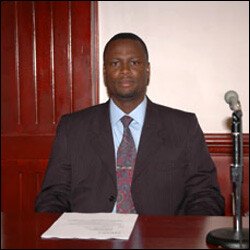
Minister of Education – Nigel Carty
Basseterre, St. Kitts – Nevis
April 13, 2010 (CUOPM)
St. Kitts and Nevis Minister of Education, Sen. the Hon. Nigel Carty is among in Paramaribo, Suriname, attending the Caribbean Conference on Higher Education (CCHE).
During the two-day conference policy makers, educators, and experts, will discuss the current situation of higher education in the Caribbean. The meeting is a joint-initiative of the Government of Suriname, the Department of Human Development, Education, and Culture (DHDEC) of the Organization of American States (OAS), the UNESCO International Institute for Higher Education in Latin America and the Caribbean (IESALC), and the UNESCO Kingston Cluster Office for the Caribbean.
The Meeting which began on Sunday opened with a call from Suriname President, His Excellency, Ronald Venetiaan, for greater collaboration among education and research institutes in the Caribbean.
At the official opening of the conference in hotel Krasnapolsky, the Head of State argued that the small scale of the Caribbean communities is leading to a lack of financial resources and expertise for education and research in different disciplines, as well as insufficient services being rendered to society by the region’s academic institutions.
“The solutions for many of these problems lies in good collaboration, which will put an end to clinging to the orientation towards the objectives and structures of institutions of our former colonizers, as well as the persistent individual orientation of many of our experts towards a possibility of success in institutions outside the Caribbean,” the President noted.
Collaborative efforts have so far proven unsustainable and there is an urgent need to reverse this, following not only the dictates of external institutions such as the European Union or other donor organizations, but preferably on the basis of “our own Caribbean initiatives for our own institutions of higher education.”
Director of the OAS’ Department of Human Development, Education, and Culture (DHDEC), Mrs. Maria Levens, noted that while the Caribbean has “worthwhile experiences to share,” the region’s participation in larger regional hemispheric conferences and other policy meetings is minimal.
Therefore the CCHE provides an opportunity to find out why internalization or cross-border education could be an advantage and a challenge. The meeting is also a venue she said to determine “how much solidarity there is from strong universities towards institutions which might need some help while they are bringing up their standards.”
Mrs. Levens urged participants to make a commitment to a special project and identify which countries might provide capacity strengthening to others.
Referring to brain drain in the Caribbean, President Venetiaan also addressed the benefits of being trained in one’s own country. He noted that when academically trained persons, including students and professors, remain in the country they raise the general intellectual level of the nation. This, he said, is important for the future development of arts and culture, the introduction and implementation of new technologies, but also for the respect for human rights, democracy and the rule of law.
Assistant Secretary General of CARICOM, Mr. Edward Greene, in his keynote address, while alluding to the regional integration process within CARICOM, said that whatever the direction of integration, countries must deal with the principles and applications of an educational strategy that would make its citizens competitive in a world defined by opportunities.
He also called for policy decisions “to find the best way to rationalize the educational system, make it more efficient and ensure that it responds adequately to the externalities without bending to the pressure.”
It is important, the CARICOM official further maintained, that the region stand up to the challenge to roll back investment in higher education by finding ways to strengthen functional cooperation across the region, so that countries can specialise in doing things that they do best, using ICT to advance the synergies among the countries.
More collaboration with the private sector and international partners, according to Greene, is necessary to increase the development of highly-trained professionals, increase research and quality and to focus on research and development. This will also enable the region to ensure a high grade and the highest quality of scientists, cultural artists and literary writers in the Caribbean. Greene also championed for the establishment of a community of universities collaborating to work together towards common objectives.
Director of UNESCO’s Office for the Caribbean, Kwame Boafo, said that the principal issues, challenges, opportunities and trends identified in earlier conferences are “as pertinent to small and island developing countries in the Caribbean as they are to other developing societies – small and large – elsewhere.”
These trends, including rapid growth in tertiary educational enrollment; the role of community colleges in diversifying and responding to the increasing need for higher education; the provision of cross-border higher education and the exponential growth in open and distance learning and e-learning, are of immediate and pertinent importance of the Caribbean.
Director of the UNESCO International Institute for Higher Education in Latin America and the Caribbean (IESALC), Jose Renato de Carvalho, said that science and technology are playing a strategic role in development, while “strengthening of higher education represents an irreplaceable element of the social process.”
He further noticed that despite the strengthening and transformation of higher education throughout Latin America “there are demands to be met, tensions to overcome and challenges to be faced.”
More than ever the region should bring higher education to the center of the public and public decision making process, said the Director of IESALC, who also called for regional platforms that make it possible to escalate initiatives to share resources and achievements and to create academic synergy on a regional base.